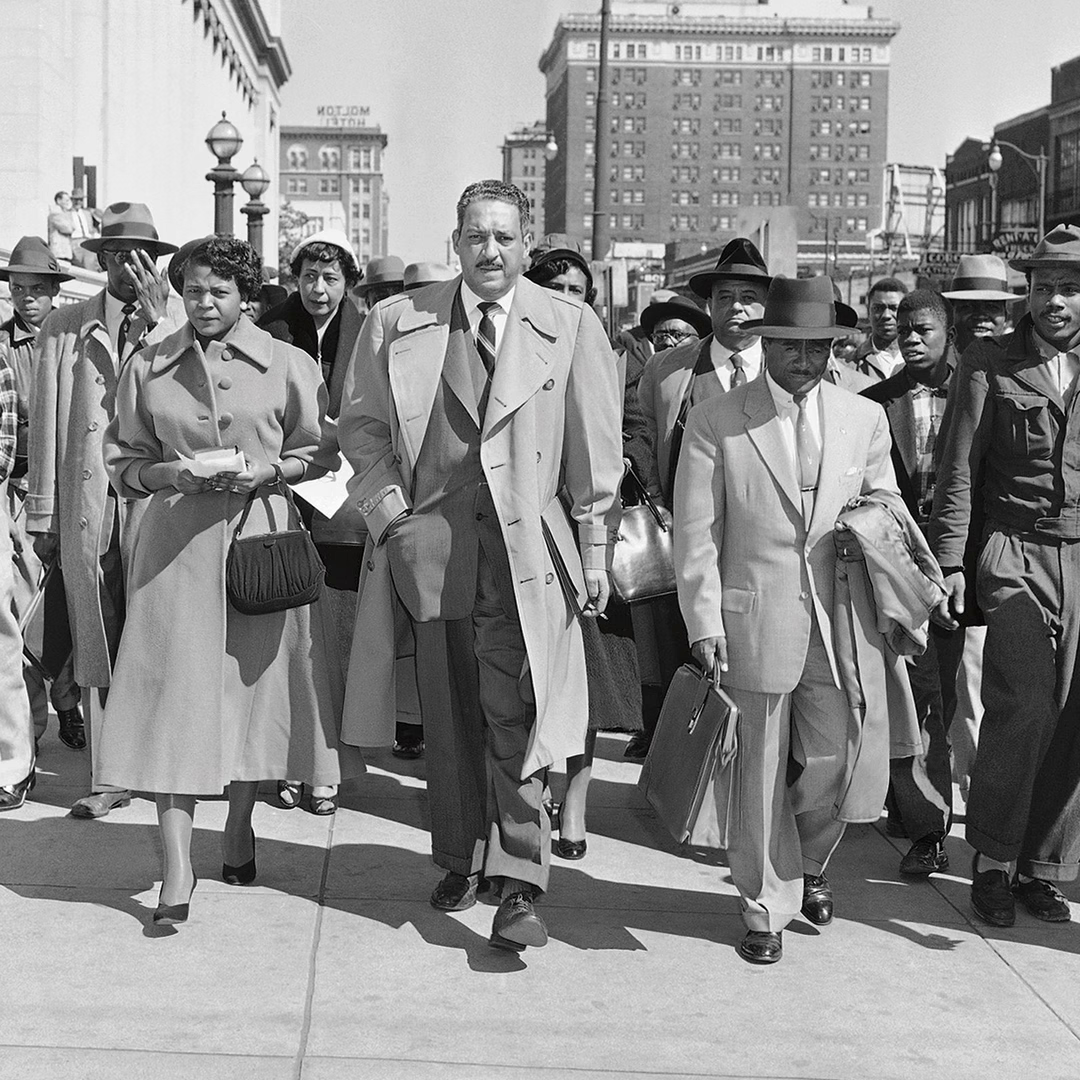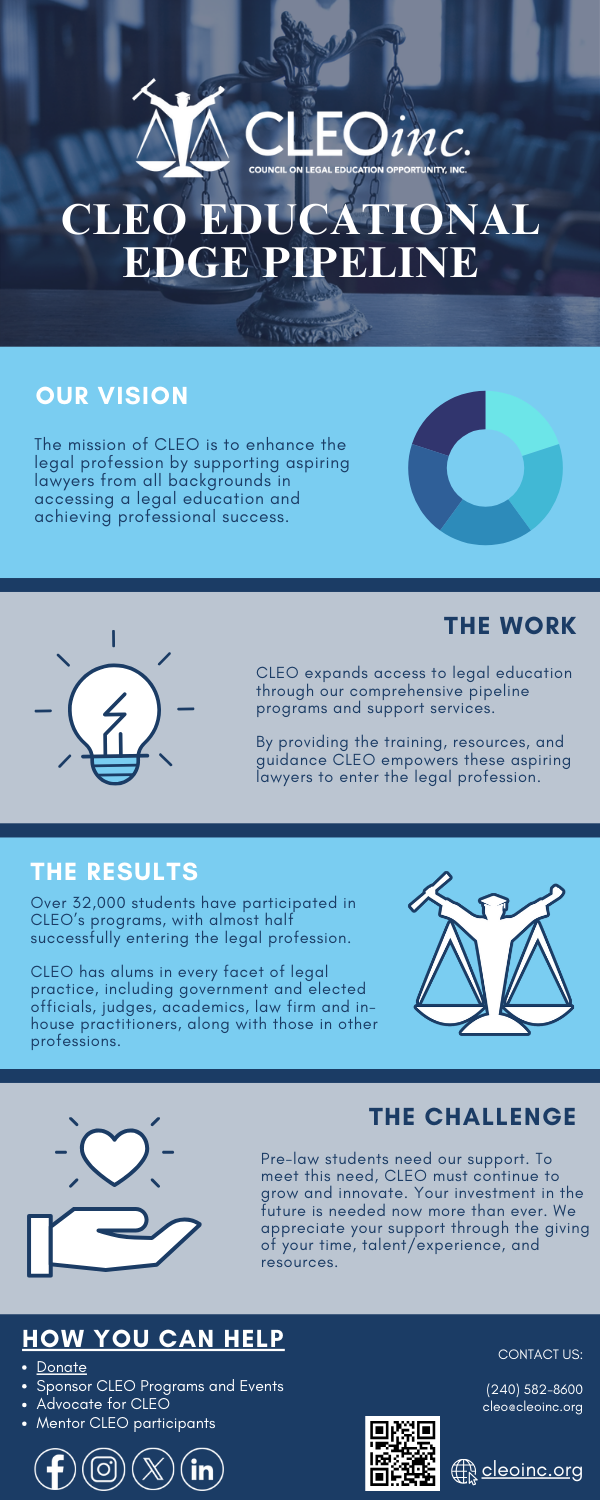CLEO SINCE 1968
TRAINING TOMORROW'S LAWYERS
PREPARING TOMORROW'S LEADERS
The Council on Legal Education Opportunity, Inc. (CLEO) is a 501(c)(3) national non-profit organization that was founded in 1968. Through CLEO’s educational programs, CLEO works to expand access and opportunities for all aspiring students to attend and succeed in law school. CLEO serves students of all identities and backgrounds. More than 32,000 students have participated in CLEO’s programs and joined the legal profession.
CLEO HISTORY
The Civil Rights Movement of the 1960s focused awareness on the lack of minority lawyers. Ninety-eight percent of the legal profession was white. Law schools had trouble finding qualified minority applicants. The legal profession needed a national commitment to attract and help minority students gain admission to law school.
The Civil Rights Movement of the 1960s focused awareness on the lack of minority lawyers. Ninety-eight percent of the legal profession was white. Law schools had trouble finding qualified minority applicants. The legal profession needed a national commitment to attract and help minority students gain admission to law school.
In 1964, Louis Toepfer, Vice Dean at Harvard Law School convened a group to discuss the possibility of encouraging black students to study law. The result was a summer program at Harvard in 1965 for 40 students, most of whom were juniors at historically black colleges. The program lasted eight weeks, was based on selected topics from first-year courses, and provided another basis for admission to law school, besides grade point average and standardized test scores. About half the students who participated in the program were admitted to law school.
Similar pilot summer programs were launched at Emory University, the University of Denver, and UCLA. In 1968, the Council on Legal Education Opportunity was established as the first national program of its kind to coordinate and recruit students to participate in these programs. Thus, the pipeline to the legal profession was opened to a stream of talented students from minority backgrounds.
In 1964, Louis Toepfer, Vice Dean at Harvard Law School convened a group to discuss the possibility of encouraging Black students to study law. The result was a summer program at Harvard in 1965 for 40 students, most of whom were juniors at historically Black colleges. The program lasted eight weeks, was based on selected topics from first-year courses, and provided another basis for admission to law school, besides grade point average and standardized test scores. About half the students who participated in the program were admitted to law school.
In 1966 and 1967, armed with a grant from the Field Foundation, Emory Law introduced the “Pre-Start” program, CLEO’s predecessor, to allow minority students to attend summer legal courses. Based on this hands-on classroom training, twelve students were admitted to Emory Law’s next class. In 1968, the Council on Legal Education Opportunity was established as the first national program of its kind to coordinate and recruit students to participate in these programs. Emory, the University of Denver, and UCLA hosted CLEO’s inaugural summer programs. CLEO established its national offices in Atlanta and, shortly thereafter, Professor Nat Gozansky became its associate director. Thus, the pipeline to the legal profession was opened to a stream of talented students from minority backgrounds.
Since its humble beginnings, CLEO has expanded its reach to students of all backgrounds and identities. By ensuring broad access to opportunities and promoting a culture of fairness, CLEO fosters a pool of legal professionals which reflects the full spectrum of talents, backgrounds, and perspectives, ready to uphold the principles of justice for everyone.

CLEO, Inc. Education Pipeline
CLEO alumni are represented in every area of society, including: the judiciary, private, in-house and government practice, academia, and federal, state, and local legislatures, agencies, and other entities across the country.
CLEO has played a critical role in empowering students to see themselves as lawyers, advancing their access to law school and increasing justice in America.

CLEO does not discriminate and offers its programs and services on an equal opportunity basis in compliance with all applicable laws. CLEO is dedicated to supporting an inclusive legal profession for everyone.
2800 Eisenhower Ave. Ste 220-41
Alexandria, VA 22314
Phone: (240) 582-8600
Email: cleo@cleoinc.org
Quick Links
For Students
News & More
© Council on Legal Education Opportunity, Inc. All rights reserved

